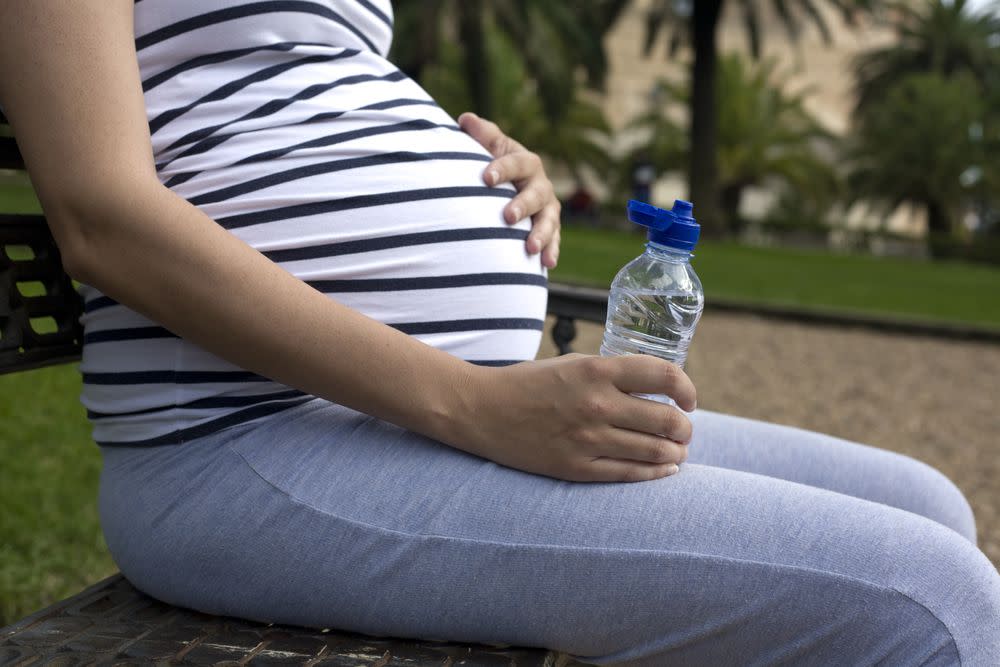6 Things That Cause Contractions in Your Third Trimester

Juan Aunion/Shutterstock
As you approach your baby's due date, you probably are expecting contractions to start soon. Contractions won't begin in earnest until the baby's delivery day arrives, but you might feel them on and off during the third trimester. These types of contractions are called Braxton Hicks contractions and are often considered "practice" contractions and are different from real contractions because they don't cause your cervix to open or thin out.
If you've given birth before, you may notice more Braxton Hicks contractions that begin even earlier. "You may get an occasional, uncomfortable tightening in the stomach—that's your uterus getting its act together, and exercising for the grand finale," says Paul du Treil, M.D., director of maternal and child health at Touro Infirmary in New Orleans. Here are six common causes of contractions in the final weeks of pregnancy.
1. Early Labor
Preterm labor—which occurs before you've finished your 36th week of pregnancy—might cause contractions in pregnant people. It's characterized by a pattern of twinging or tightening of the uterine wall (not occasional pain) that doesn't go away. "If you're having a lot of contractions for several hours in a row, then you need to come in and be evaluated," says Bart Putterman, M.D., an OB-GYN at Texas Children's Pavilion for Women in Houston. Preterm labor might lead to premature birth, which is linked to fetal breathing problems, low birth weight, vision problems, and other issues, so it's important to get checked out right away.
2. Overexertion
You may not want to slow down during the third trimester, but overtaxing your body could cause your uterus to start "false" contractions. "If you're doing too much, you could cause Braxton Hicks contractions," Dr. Putterman says. As we mentioned earlier, Braxton Hicks are practice contractions that help your body prepare for delivery—and they often go away once you put your feet up and chill. They're usually sporadic, slightly uncomfortable, and last anywhere from 30 seconds to two minutes. There's no need to call your health care provider for occasional Braxton Hicks contractions; most people notice them sometime after 20 weeks of pregnancy.
3. Dehydration
Dehydration can also kick-start those false Braxton Hicks contractions, so make sure you're drinking plenty of water. "If a patient calls about their contractions, one of the first things we tell them is to go drink a big glass of water," Dr. Putterman says. "If they don't feel better, they probably need to come in and get checked." As it happens, a too-full bladder can also cause Braxton Hicks contractions, so make sure you urinate often.
4. Having Sex
Having sex has also been linked to jump-starting Braxton Hicks contractions. It's probably because orgasms and the prostaglandins in semen cause the uterus to contract. These false contractions should subside soon after they begin. As always, call your doctor if they're becoming longer or more intense, or if they fall into a predictable pattern.
5. Pregnancy Complications
If you develop painful contractions and vaginal bleeding, you need to contact the doctor immediately. "If the tightness lasts more than two minutes, they need to call right away," says Siobhan Kubesh, a certified midwife with OBGYN North in Austin. "Contractions that do not go away are a sign of trouble." Even in the thick of labor, your body will give you a short break between contractions, so if your contractions don't take a breather, it could indicate a dangerous complication, such as uterine rupture.
6. Labor
The cause of contractions after 37 weeks could mean that it's finally time for your baby to arrive! Although the contractions may start out irregularly, if you've reached your delivery day, they'll soon start developing a regular rhythm. "If it's real labor, the contractions are going to gradually get closer together and longer and stronger," Dr. Putterman says.
In most cases, doctors will recommend that you head to the hospital or birthing center once your contractions are a minute long and start four to five minutes apart. But your health care provider may suggest a different threshold for you, depending on your risk factors, your proximity to the hospital, and other individual issues. Follow your doctor or midwife's advice—and get ready to snuggle that baby!
RELATED: 9 Signs That Labor Is Approaching
Note: If you're antsy to deliver your baby, you may wonder how to start contractions on your own—and we're talking actual labor contractions instead of the false Braxton Hicks ones. However, experts agree that it's best to wait things out as long as possible. Vital fetal development happens even in the last weeks of pregnancy, and inducing labor yourself can have negative consequences.
That said, certain movements (such as pelvic tilts and sitting on a birthing ball) can help move the baby into the proper position, which might put favorable circumstances in place for delivery. Having sex, walking around, and paying attention to your body's alignment can also soften the cervix to encourage contractions. If you're ready to get the labor party started, talk to your doctor about what options you might have for jumpstarting labor at home. (Although keep in mind that most doctors will encourage you to go as long as safely possible in your pregnancy and to let labor start naturally.)
RELATED: How to Induce Labor at Home

